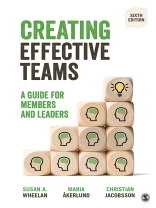A practical guide for building and sustaining top-performing teams
Based on the authors′ many years of consulting experience with teams in the public and private sectors,
Creating Effective Teams: A Guide for Members and Leaders describes why teams are important, how they function, and what makes them successful. The texts covers the four stages of team development —forming, storming, norming, and performing— to help readers effectively navigate these different phases. Separate chapters are devoted to the responsibilities of team leaders and team members. Susan A. Wheelan, Maria Akerlund, and Christian Jacobsson highlight common problems that occur frequently in groups as well as provide practical tips, real-life examples, and questionnaires to help address those problems.
Зміст
Preface
About the Authors
Chapter 1 • Why Groups?
Groups Have a Long History of Success
We Need Groups Every Day
Groups Increase Our Knowledge Base
When Teams Are Good, They’re Very, Very Good
Creating Effective Teams
How to Use This Book
Chapter 2 • Effective Organizational Support for Teams
Plant Groups in a Favorable Organizational Climate
Give Groups What They Need to Do Their Best
Pick Members Based on Their Ability to Do the
Task and Their Ability to Contribute to Group Success
Educate People for Group Participation Competence
Avoid Unsubstantiated Team Development and Consultation Strategies
Avoid Helping Groups Too Much
Make Sure Each Group Has Enough Autonomy to Do Its Work but Remains Connected With the Rest of the Organization
Conduct Organizational Support Reviews Regularly
The Organizational Support Checklist
Chapter 3 • From Groups to Teams: The Stages of Group Development
Stage 1: Dependence and Inclusion
Stage 2: Counterdependence and Fighting
Stage 3: Trust and Structure
Stage 4: Work and Productivity
Surviving Group Development
Chapter 4 • How Do High Performance Teams Function?
The Characteristics of High Performance Teams
Ten Keys to Productivity
Team Performance Checklist
Chapter 5 • Effective Team Members
Don’t Blame Others for Group Problems
Encourage the Process of Goal, Role, and Task Clarification
Encourage the Adoption of an Open Communication Structure in Which All Member Input and Feedback Are Heard
Promote an Appropriate Ratio of Task and Supportive Communications
Promote the Use of Effective Problem-Solving and Decision-Making Procedures
Encourage the Establishment of Norms That Support Productivity, Innovation, and Freedom of Expression
Go Along With Norms That Promote Group Effectiveness and Productivity
Promote Group Cohesion and Cooperation
Effective Member Checklist
Chapter 6 • Effective Team Leadership
Don’t Take On Every Leadership Assignment You Are Offered
Adjust Your Leadership Style to Meet the Developmental Needs of the Group at a Particular Time
Leadership at Stage 1: Be a Directive and Confident Leader
Leadership at Stage 2: When Members Begin to Demand More Participation in Running the Group, Slowly Begin to Empower Them
Leadership at Stage 3: Involve Members in the Leadership Function
Leadership at Stage 4: Participate as an Expert Member of Your Team
Effective Leader Checklist
Chapter 7 • Navigating Stage 1
Goals of Stage 1
Concerns About Safety and Inclusion
Dependence on the Designated Leader
A Wish for Order and Structure
Chapter 8 • Surviving Stage 2
Goals of Stage 2
Create a Unified Group Culture
Create a Unified and Effective Group Structure
Chapter 9 • Reorganizing at Stage 3
Goals of Stage 3
Fine-Tuning Roles, Organization, and Procedures
Solidifying Positive Relationships
Chapter 10 • Sustaining High Performance
Goals of Stage 4
Getting the Work Done Well
Making Decisions
Cohesion and Conflict
Maintaining High Performance
Chapter 11 • Changes in Team Functioning
Fluid Teams
Self-Managed Teams
Agile Teams
Virtual Teams
Multicultural Teams
Chapter 12 • Research on the Integrated Model of Group Development
Does the Model Describe What Really Happens in Groups?
How Are Groups Distributed Across the Four Stages?
On Average, How Long Does the Development Process Take?
Does Team Building Have Any Effect?
Does Group Size Affect Group Maturity?
How Do Work Groups in Different Sectors Function?
A Final Thought
Bibliography
Index
Про автора
Christian Jacobsson is head of research at GDQ Associates AB and associate professor in the Department of Psychology at the University of Gothenburg in Sweden. He is a licensed psychologist and has worked as an industrial and organizational psychologist for about 35 years and been involved in many large-scale team development projects as a project leader. Christian mainly conducts research on leadership and team development and has published about 60 articles, conference proceedings, or books on these topics. He is one of the authors of the books Teamutveckling i Teori och Praktik (Team Development in Theory and Practice) and Teams in the Spotlight.












